Say what you mean
Just like labelling a jar in your pantry, labelling your content well means people can find what they’re looking for. Having three identical jars all labelled rice is not going to help you distinguish your Arborio from your Basmati without looking at the contents. It’s the same with your website. Your labels need to tell users what the page is all about. They should also encourage users to visit your webpage by providing an accurate description of the content.
Use keywords up front
It’s also important for your content to contain keywords – words and phrases that identify what the content is about and that help search engines with the indexing process and to use those keywords early in the content and in your titles.
This will also help your search engine ranking, where you appear on the search page, when a potential client is searching for content that relates to the keywords you have included.
According to many SEO experts labelling your pages and posts with keywords at the start of the title helps both users and your SEO. This is because the early words are more significant from a search engine perspective, so putting keywords up front means your content should rank better for those keywords. It’s also helpful from a user perspective if the keywords are at the start of the title because it makes it easier to spot them when scanning a list of search results.
Avoid symbols and numbers
For your well-written title to translate into a meaningful web page address (URL), it’s best to avoid symbols and numbers. In our experience, many law firms simply let their website content management system (CMS) or IT support handle labelling and URLs. Often this results in a meaningless URL that includes a lot of symbols and numbers, for example http://lawfirmwebsite.example/?p=123. This does absolutely nothing to help users or search engines find your content.
A better way to structure your URLs is to make sure that all your webpages have a consistent and meaningful URL. Usually it will be something that reflects the page title and includes your brand or firm name. It doesn’t have to be a complete sentence, in fact it’s better to leave out words like ‘a’ and ‘the’ from URLs. But it should give the reader an idea of the page content. It should also include keywords to help your SEO.
Smart labelling for better SEO
By following these three simple suggestions, you can easily improve your website’s SEO. It will also make for a better user experience by ensuring that visitors to your firm’s website can readily identify the information that interests them and that the content of your website matches what they are searching for.
Your online content is a valuable asset, so make sure people can find it and understand it by being smart about your labelling.
About the author




